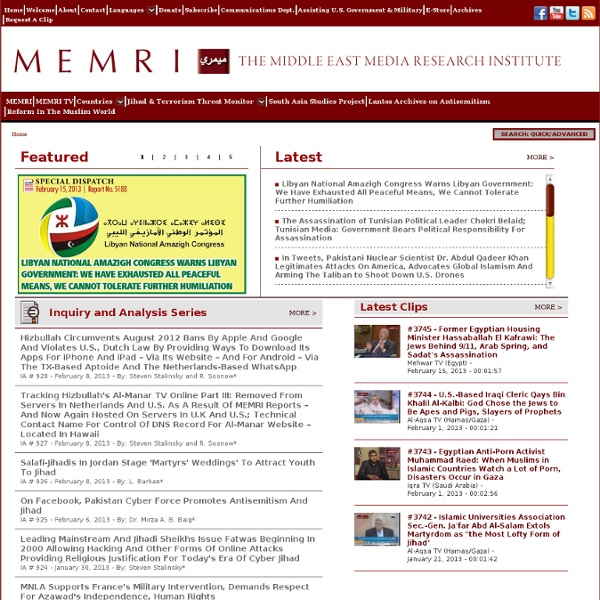



Welcome To The API Website Chinadaily US Edition Selective Memri | World news For some time now, I have been receiving small gifts from a generous institute in the United States. The gifts are high-quality translations of articles from Arabic newspapers which the institute sends to me by email every few days, entirely free-of-charge. The emails also go to politicians and academics, as well as to lots of other journalists. The stories they contain are usually interesting. Whenever I get an email from the institute, several of my Guardian colleagues receive one too and regularly forward their copies to me - sometimes with a note suggesting that I might like to check out the story and write about it. If the note happens to come from a more senior colleague, I'm left feeling that I really ought to write about it. The organisation that makes these translations and sends them out is the Middle East Media Research Institute (Memri), based in Washington but with recently-opened offices in London, Berlin and Jerusalem. Mr Awadh is not exactly an independent figure.
Center for American Progress ParisMatch Yes, MEMRI, there is a Fatwa from Khamenei forbidding Nukes I’m told that MEMRI, which has its origins in Israeli military intelligence, has put out a statement doubting that Iranian Supreme Leader Ali Khamenei ever issued a fatwa forbidding nuclear weapons. (MEMRI claims to be a 501(c)3 non-profit but is actually an effort to cherry-pick Middle Eastern news to present the most negative face of the Arab world to Americans so as to prejudice them in favor of Israel; in this case it is just doing propaganda). A Reddit.com contributor has effectively answered this piece of disinformation. This posting points out that the official IRNA news agency said in 2005, “The Leader of the Islamic Republic of Iran, Ayatollah Ali Khamenei has issued the Fatwa that the production, stockpiling and use of nuclear weapons are forbidden under Islam and that the Islamic Republic of Iran shall never acquire these weapons.” That this old posting has gone into the deep web and isn’t at the IRNA site is irrelevant. There is another consideration.
Women's Media Center Alarabiya.net English | Front Page Middle East Media Research Institute - Profile - Right Web - Institute for Policy Studies Please note: IPS Right Web neither represents nor endorses any of the individuals or groups profiled on this site. Founded in 1998 "to inform the debate over U.S. policy in the Middle East," MEMRI (the Middle East Media Research Institute) claims to be an "independent, nonpartisan, nonprofit" organization. However, while the group is lauded by some observers for revealing various facets of Arab society to broader audiences, its trajectory and direction have been largely dominated by hawkish "pro-Israel" politics, and its work has been repeatedly criticized for being biased and at times purposely misleading. Among MEMRI's key activities are publishing translations and analyses of news sources from throughout the Greater Middle East. Leadership MEMRI was founded by Meyrav Wurmser and Yigal Carmon, both of whom have ideological affinities with Israel's conservative Likud Party. Funding According to tax records, in 2001 MEMRI had an operating budget of just under $2 million. Criticism
History | ALEC – American Legislative Exchange Council More than 40 years ago, a small group of state legislators and conservative policy advocates met in Chicago to implement a vision: A nonpartisan membership association for conservative state lawmakers who shared a common belief in limited government, free markets, federalism, and individual liberty. Their vision and initiative resulted in the creation of a voluntary membership association for people who believed that government closest to the people was fundamentally more effective, more just, and a better guarantor of freedom than the distant, bloated federal government in Washington, D.C. At that meeting, in September 1973, state legislators, including then Illinois State Rep. Henry Hyde, conservative activist Paul Weyrich, and Lou Barnett, a veteran of then Gov. Ronald Reagan’s 1968 presidential campaign, together with a handful of others, launched the American Legislative Exchange Council. The Birth of ALEC Task Forces From Clearinghouses to Think Tanks The ALEC Formula for Success
REPORT: Broadcast News Networks Misrepresent Intelligence On Iranian Nuclear Issues Many in the media have long since repudiated their failures in the lead-up to the Iraq War, acknowledging that they were too quick to accept the false notion that Iraq possessed a sizable and dangerous cache of weapons of mass destruction. The question today is whether they have learned from those mistakes. The media's self-reflection began as early as May of 2004, little more than a year after the conflict began, when The New York Times editorial board reflected on the paper's coverage of the war and stated that they "found a number of instances of coverage that was not as rigorous as it should have been." Top editors at the Times and The Washington Post subsequently acknowledged they had failed to push for front-page articles on "the flimsiness of the intelligence on W.M.D." The media's poor coverage has been noted by the Post 's Walter Pincus , CNN's Howard Kurtz , CBS' Katie Couric , and many more . Key Findings Problematic coverage Results
Center for Immigration Studies | Low-immigration, Pro-immigrant